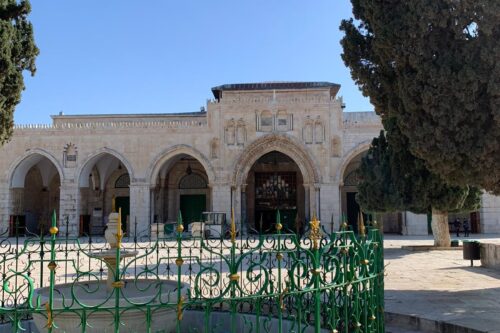Deir Yassin massacre: A memory that demands justice
![Jewish_militias_in_the_village_of_Deir_Yassin,_April_1948_(cropped_and_edited) Fighters from Israel's pre-state militia occupying the village of Deir Yassin, April 1948 [IDF archive / Wikimedia]](http://www.interpal.org/wp-content/uploads/2025/04/Jewish_militias_in_the_village_of_Deir_Yassin_April_1948_cropped_and_edited-e1745166391491-1200x800.jpg)
On 9 April 1948, in the small Palestinian village of Deir Yassin, one of the most haunting atrocities of the Nakba unfolded. Over 100 men, women, and children were brutally killed by Zionist militias, primarily the Irgun and Lehi, in an attack that has scarred Palestinian memory and history. As we approach the 77th anniversary on 7 April 2025, the legacy of Deir Yassin remains as relevant as ever.
The massacre was not an isolated act of wartime violence. It was a calculated campaign of terror – intended to force Palestinians to flee their homes. Survivors recounted scenes of horror: indiscriminate shootings, mutilation, and the execution of prisoners. Even by the standards of 1948, the atrocity shocked many. International observers, including Red Cross representatives, confirmed the scale of the killings. Yet no justice has ever been served.
Deir Yassin’s fate played a pivotal role in the forced displacement of over 750,000 Palestinians during the Nakba. The fear it instilled – amplified through word of mouth, leaflets, and deliberate propaganda – served its purpose. Entire communities evacuated their villages, fearing a similar fate. Deir Yassin was not only a massacre; it was a psychological weapon.
Today, the village no longer exists as it once did. Its land is now part of the illegal Kfar Shaul settlement on the outskirts of West Jerusalem, its history buried under Israeli buildings and institutions, including a psychiatric hospital. The original residents have never returned. Their descendants now form part of the millions of Palestinian refugees still denied their right of return.
The memory of Deir Yassin is not just a reflection of the past – it is a lens through which we must view the present.
The same logic of dehumanisation and forced expulsion that led to Deir Yassin continues to underpin the Israeli occupation today. From the relentless bombardment of Gaza, to the demolition of homes in the West Bank, to the apartheid policies exposed by leading human rights groups, the Nakba is not over – it is ongoing.
In 2025, the world must no longer look away.
We call on British Muslims and allies of justice to:
- Raise awareness of the Deir Yassin massacre and the broader reality of the Nakba. Speak about it in your mosques, schools, and communities.
- Lobby your MP to demand that the UK recognises the Nakba and holds Israel accountable for ongoing violations of international law.
- Learn about the boycott of companies complicit in Israeli occupation and settler violence from the BDS Movement.
- Insist that Britain acknowledges its historical role in Palestine’s dispossession, particularly through the Balfour Declaration and its facilitation of settler colonialism.
As Palestinians continue to fight for freedom, justice, and return, we must never forget Deir Yassin. It is a wound that remains open, but it is also a call to conscience – a reminder of what happens when silence replaces solidarity.
This April, remember Deir Yassin. Speak truth. Demand justice. Never again – means now.
#PalestineFacts
Calculate your Zakat
Confused about how to calculate your Zakat? Try our simple-to-use calculator

![The 2025 Gaza Freedom Flotilla - Madleen - departing Catania, Sicily on 1 June 2025 [Tan Safi / Freedom Flotilla Coalition]](http://www.interpal.org/wp-content/uploads/2025/06/freedom-flotilla-madleen-500x333.jpg)
![A view of Jerusalem, Occupied Palestine, published on January 2022 [Ilanit Ohana / Unsplash]](http://www.interpal.org/wp-content/uploads/2025/06/ilanit-ohana-A6eCf7FvGFk-unsplash-500x333.jpg)


